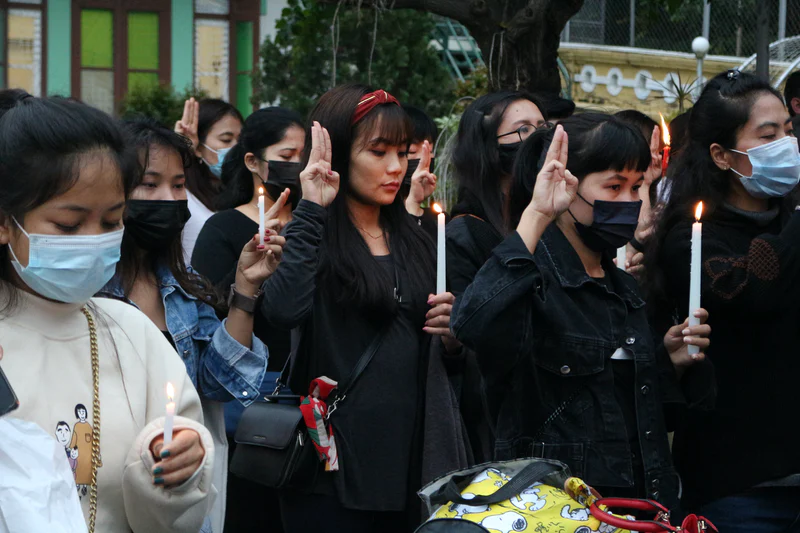Myanmar’s Attack on Democracy
Protestors have taken to the streets of Myanmar after the February 1st, 2021 coup reinstated full military control.
Protestors hold up the three-finger salute, which originated in the ‘Hunger Games’ films. It has been adopted by activists from Thailand to Myanmar, becoming a symbol of resistance and solidarity with democracy.
Protestors are flooding the streets of Myanmar in response to the country’s fascist military, the Tatmadaw, overthrowing the country’s fragile democratic government in a coup d’état on February 1st, 2021. Peaceful, pro-democracy demonstrations have already succumbed to paramilitary operations.
The demonstrations were initially met with subdued responses from military leaders, but the Tatmadaw’s reaction has since mounted into a series of violent attempts to put down the uprising that has so far wounded thousands and killed at least 550. Of those people, at least forty-five were confirmed to be children.
The coup began when Myanmar’s de facto leader, Daw Aung San Suu Kyi, and other top political leaders, including President Win Myint, were detained in a raid. The country’s deposed civilian official then faced allegations of breaking the country’s official secrets act, illegally owning walkie-talkies, and releasing information that could “cause fear or alarm” in a secret court during the weeks following the coup.
Although the military had previously agreed to the country’s transition towards democracy, it had never entirely relinquished control, maintaining veto power and a fixed number of seats in parliament. Suu Kyi and the National League for Democracy (NLD), Myanmar’s largest civilian party, sought to delegate more power to the civilian government in the later months of their first term, but the military did not agree.
During the country’s November 8th, 2020 elections, the NLD secured 83 percent of the Parliament’s available seats. The Tatmadaw, which had supported the opposition, refused to accept the outcome of the election and demanded a rerun due to alleged fraud. Despite these demands, the new Parliament decided to endorse the election results and approve the next government.
The military had finally gone to the country’s Supreme Court in hopes of arguing that the election results were fraudulent. According to the election commission, there was no evidence to back up these arguments. The possibility of the coup emerged when the military threatened to “take action” and surrounded the houses of Parliament.
A military-owned television station, Myawaddy TV, effectively announced the coup when an anchor cited the 2008 Constitution, which allows the military to declare a national emergency. The military declared that the state of emergency would only last for one year, promising that it will hold elections afterward. It is unclear, however, if that pledge was genuine or a ploy to buy time.
The Tatmadaw instantly took control of Myanmar’s infrastructure, halting most news broadcasts and canceling domestic and international flights. In major cities, phone and internet service has been discontinued. The stock exchange and commercial banks were closed, and long queues were seen outside ATMs in certain areas. Residents in Yangon, the country’s largest city and former capital, rushed to markets to load up on food and other necessities.
On February 20th, 2021, two unarmed demonstrators, including a 16-year-old child, were killed by security forces in Mandalay, ending weeks of largely peaceful demonstrations. Since then, a burgeoning civil disobedience movement has crippled the financial system and, making it difficult for the military to accomplish much. As the protests transitioned into their second month, the military became more brutal in its reaction.
According to a tally by Myanmar Now, including the toll from the crackdown’s bloodiest day to date, March 27th, 2021, the military has killed over 550 civilians and assaulted, arrested, or tortured thousands more.
Despite the danger, women have been at the forefront of Myanmar’s protest movement, delivering a powerful message to the generals who deposed a female leader and reinstated a patriarchal order that has oppressed women for half a century. Hundreds of thousands of women have marched every day, representing teachers, garment workers, and medical workers, all of which are women-dominated.
Even as the Tatmadaw continues to harm unarmed protesters, the movement continues to grow larger and more diverse. People of all religions, sexualities, genders, and ages flood the streets of Myanmar for one common cause: democracy.
People of all religions, sexualities, genders, and ages flood the streets of Myanmar for one common cause: democracy.
Ramisa Promi is a Managing Editor/Advisory Editor for ‘The Science Survey’. Ramisa finds journalistic writing appealing because it gives writers the...











